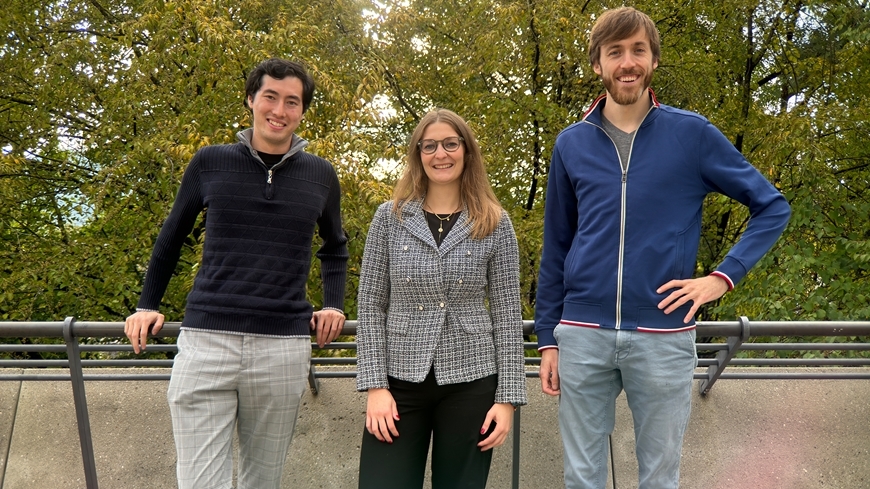Empa Entrepreneur Fellowship
Tomorrow's start-ups: Empa supports neo-entrepreneurs
Drones for firefighting, surgical laser tissue soldering with robots and software for intelligent energy management: This year, three Empa researchers have been awarded an Empa Entrepreneur Fellowship to develop innovative products based on their research.

Empa's start-up support has received an additional boost through this year's Empa Entrepreneur Fellowship. This fellowship has been awarded for the third time to young researchers who want to turn application-oriented research into innovative products or services.
An AI-based platform for intelligent energy management
More and more electric vehicles and smart buildings are being integrated into modern power grids – a development that poses new challenges for operations. Federica Bellizio wants to use the Empa Entrepreneur Fellowship to develop a management platform that serves as an interface between grid operators and providers of energy management systems. As a postdoctoral researcher at Empa, she is working on a solution that helps e-mobility and building operators to manage their energy efficiently, reduce grid operating costs and delay expensive grid reinforcements. “Our goal is to drive the electrification of the building and mobility sector, which ultimately strengthens the entire electricity system,” explains Bellizio, who has been researching the decarbonization of the electricity grid for years.
Her platform combines artificial intelligence (AI) with physical models to efficiently control and monitor local energy resources such as heat pumps or electric vehicles. This reduces energy consumption and the carbon footprint. At the same time, grid-supporting services enable providers of energy management systems to generate additional income. This also benefits grid operators, as they can optimally integrate and use decentralized energy resources in the grid. “The development of such a platform requires specialized expertise, tailored communication between the various players and a suitable test infrastructure in order to effectively manage the competitive risks in this highly competitive industry,” explains the Empa researcher.
Laser tissue soldering for surgery
Surgical procedures with the smallest possible incisions and as little tissue damage as possible ensure that patients recover more quickly and spend less time in hospital. Oscar Cipolato has therefore developed a minimally invasive technology at Empa and ETH Zurich that closes internal wounds precisely and seamlessly with the help of a laser. With the support of his Empa Entrepreneur Fellowship, he now wants to bring his dissertation project to market maturity. The special feature of the novel laser tissue soldering: Fluorescent nanoparticles embedded in protein-based soldering material enable continuous temperature control during the procedure. “Our patented technology displays the tissue temperature in real time, which makes laser soldering safer and more precise,” explains Cipolato.
Thanks to the nano-thermometers, tissue damage is minimized, and stable, watertight connections are created, thus reducing the risk of complications such as infections. According to Cipolato, this technology is particularly useful where conventional sutures reach their limits – for example in sensitive soft tissue or in minimally invasive surgery with robotic systems. “Our technology not only improves the performance of surgical robots, but also gives manufacturers of these robots a clear competitive advantage in a growing market.”
Drones for extreme temperatures
Firefighters and inspectors often have to work under extreme conditions – be it to assess hazards, locate victims or inspect infrastructure. As part of his Empa Entrepreneur Fellowship, David Häusermann is developing a drone that can withstand extreme temperatures: the FireDrone. It is intended for firefighting and industrial inspections and can fly at temperatures of up to 200°C. The drone is protected by polyimide aerogel insulation and a unique cooling system developed at Empa.
Häusermann, who developed the first prototype for his master's thesis at Empa and tested it in a real fire scenario, is convinced of the potential of the FireDrone: “Our drone enables emergency services to safely monitor dangerous areas and assess situations from a distance.” A unique feature is that the flying robot can also fly indoors – a decisive advantage for fires or industrial inspections. According to Häusermann, there are currently no robots with comparable capabilities. “Our long-term goal is to establish the FireDrone worldwide as an integral part of fire protection systems and for inspections in extreme environments.”
Federica Bellizio
Urban Energy Systems
Phone +41 58 765 39 31
Oscar Cipolato
Particles-Biology Interactions
Phone +41 58 765 76 99
David Häusermann
Sustainability Robotics
Phone +41 58 765 41 45
-
Share






